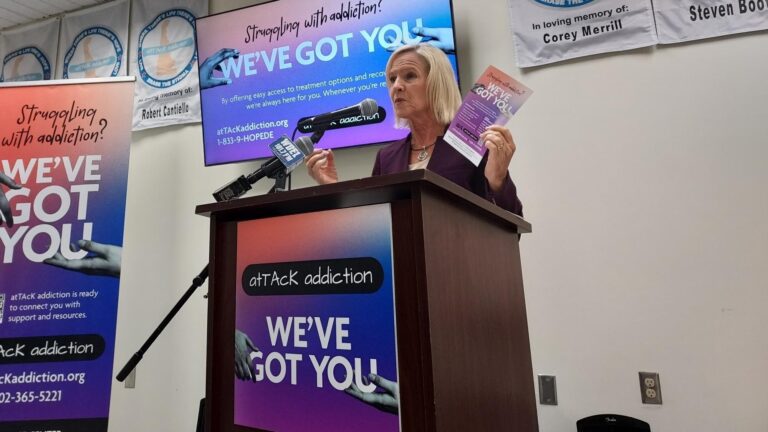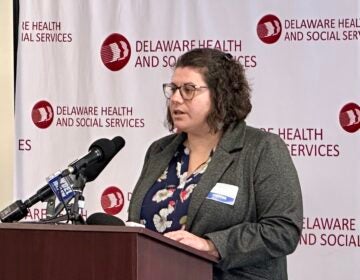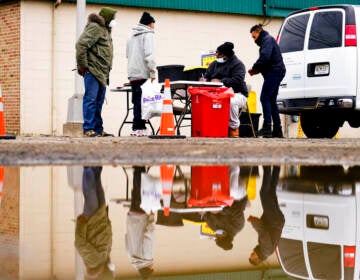Delaware reports spike in opioid overdoses after data indicated downward trend
Drug cocktails are causing users to have difficulty breathing and hallucinations, officials say.

Lt. Gov. Bethany Hall-Long speaks at Monday's atTAcK Addiction media campaign kickoff where the nonprofit will be using messaging to persuade all Delawareans that they all have a role in reducing the impact of the opioid crisis. (Sarah Mueller/WHYY News)
From Philly and the Pa. suburbs to South Jersey and Delaware, what would you like WHYY News to cover? Let us know!
Areas in Delaware are seeing a spike in opioid overdoses just weeks after state officials expressed optimism that overdoses were trending down.
As of May 5, there have been 96 suspected overdoses in Sussex County and 55 in Kent County this year, according to Delaware State Police and health officials. There have been six fatalities presumed to be caused by opioid overdoses. The majority of overdoses in Sussex occurred in the area of Georgetown, Millsboro and Milford.
The Delaware National Guard, enlisted by the Delaware Department of Health and Social Services to test packages causing the suspected overdoses, found a mixture of drugs, including synthetic opioid fentanyl, animal tranquilizer xylazine and bromazolam, a benzodiazepine that acts like a sedative.
Jill Fredel, spokesperson for atTAcK Addiction, a nonprofit that teaches young people about addiction, said, “It’s kind of like a Frankenstein concoction.”
“Hopefully this has gotten people worried that they don’t want to stumble across this, don’t want to use it,” she said. “We’re hoping that they will connect with atTAcK Addiction, or the Delaware helpline, or go to HelpIsHereDE.com and get the connection to treatment that they really do need.”
Joanna Champney, director of the Delaware Division of Substance Abuse and Mental Health, said the addition of the benzodiazepine to the drug cocktail is causing people to have difficulty breathing, convulsions and hallucinations.
“We have been seeing these elevated symptoms, resulting in people needing to be intubated,” she said. “Sometimes being unconscious for several days.”
Fredel said DHSS is always exceedingly careful to not to release too much information about the package or dealer in case someone tries to find that batch.
Champney said they are educating drug users, people doing street outreach, medical providers and addiction treatment specialists to help them understand what’s in the drug supply. She said they’ve also done an increased push to get Narcan, an overdose reversal medication, out to those who need it.
atTAcK Addiction also kicked off a statewide campaign Monday called “We’ve Got You,” which aims to highlight how all Delawareans can play a role in combating addiction. A news release said the campaign will feature radio, print, digital and social media ads in English and Spanish, and also messaging in convenience stores, at bus stops and inside buses. The group will also ask community partners to share prevention messages. It’s being funded by a $300,000 grant from Delaware’s Prescription Opioid Settlement Distribution Commission.
Last month, the Delaware Department of Health Social Services announced drug overdoses were slightly down for the first quarter of this year and for the first time in a decade. In 2023, there were 527 accidental drug overdose deaths, representing a 1.8% decrease compared to 2022.
The state’s Forensic Science division reported 537 deaths in 2022 from drug and alcohol intoxication, an increase of about 4.3% from the 514 deaths in 2021.

Get daily updates from WHYY News!
WHYY is your source for fact-based, in-depth journalism and information. As a nonprofit organization, we rely on financial support from readers like you. Please give today.






